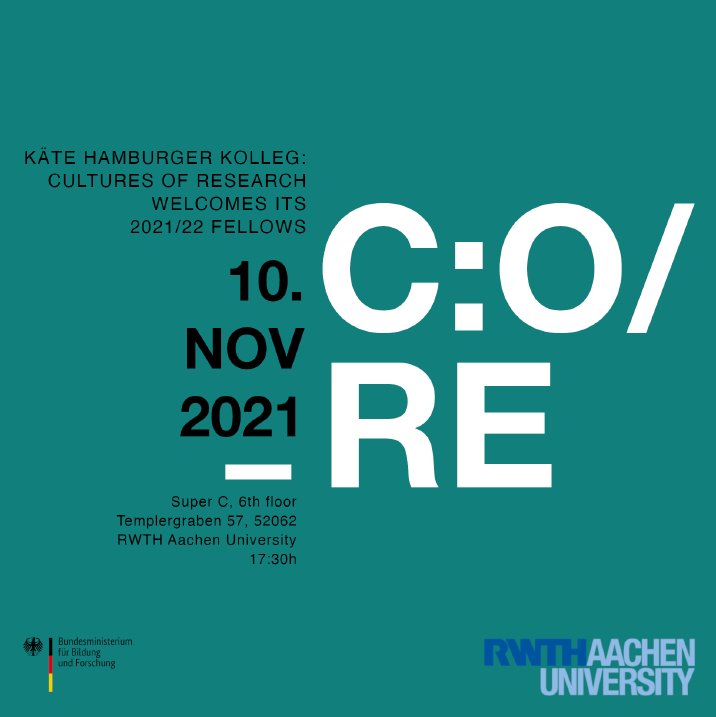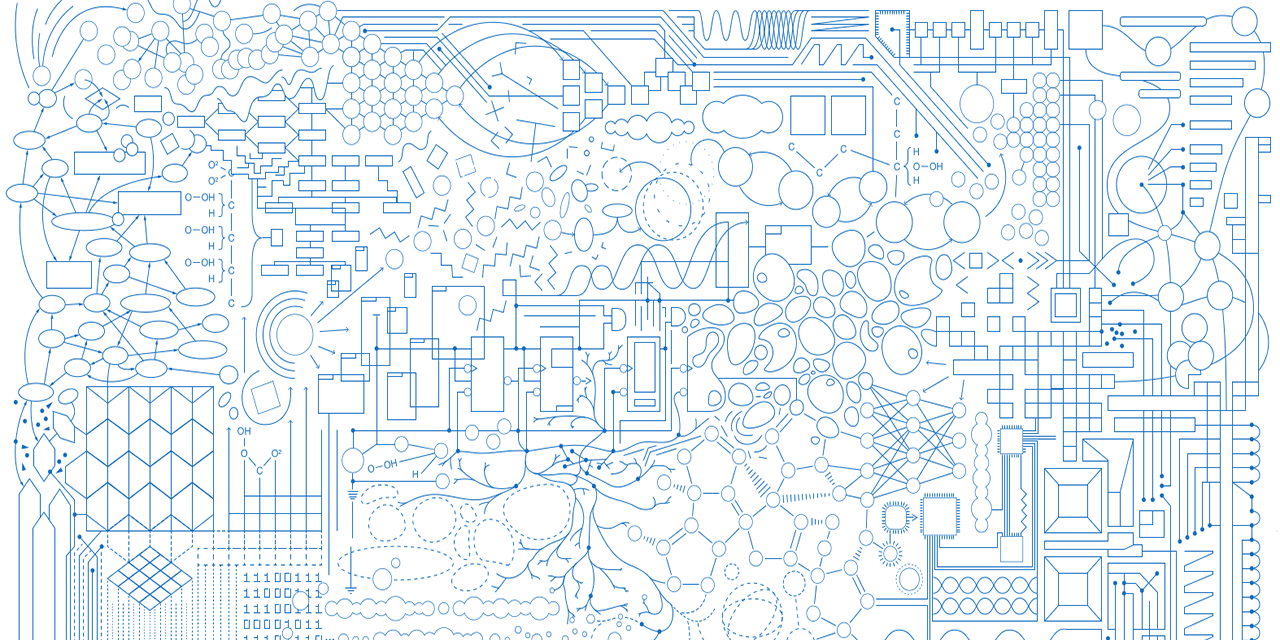Steal this Blog Post!
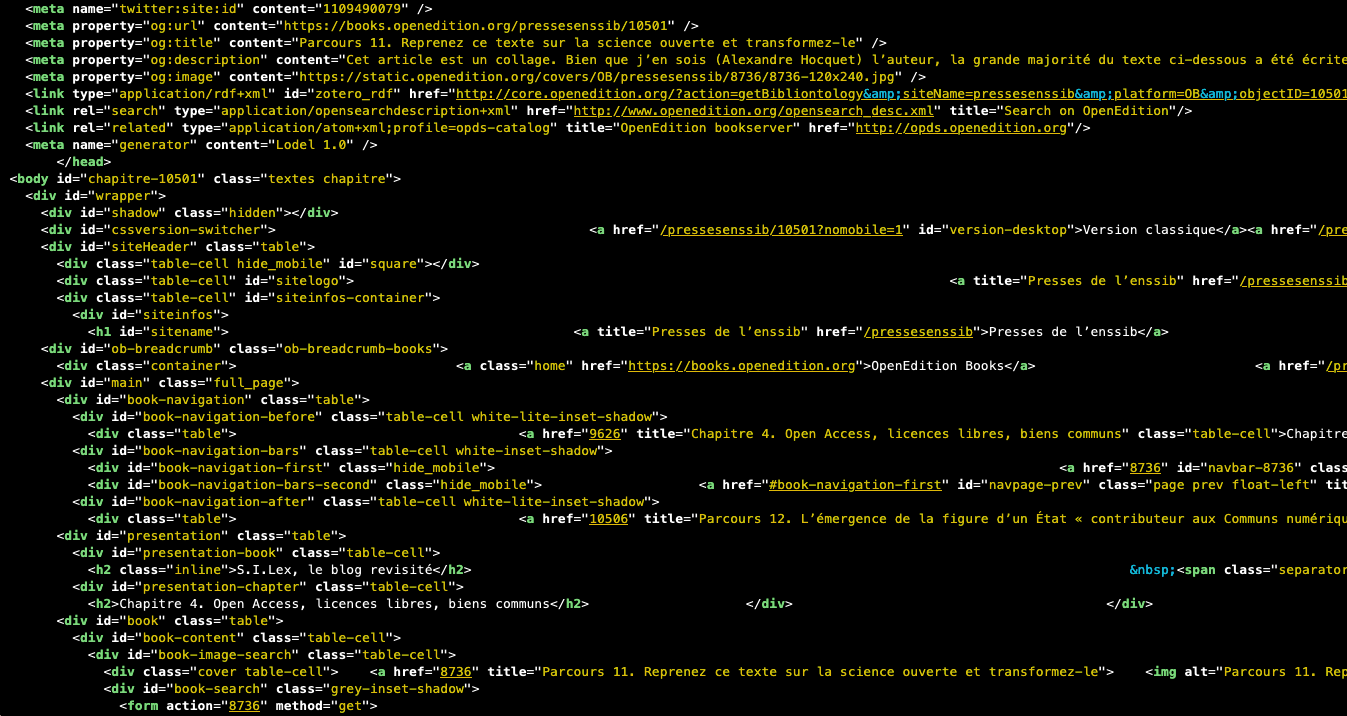
ALEXANDRE HOCQUET
Together with ALIN OLTEANU, STEFANIE HAUPT
This text is a collage, licensed under a CC0 license. It was taken from another author, without mentioning or citing them. We changed the original, as this license allows doing so. The original arguments have been copied and pasted, passages have been deleted, their order has been changed and we added more text.[1]We have even let the originally French text run through an open source translation program. A new text emerged, which can suffer the same fate: you can steal this blog post.[2]The title is a reference to the 1970s counterculture textbook titled “Steal this book”. We are not the first to make use of this pun. See, for example, “Steal this review” by … Continue reading Indeed, this text is already a modified version of a first collage and a part of the ambition of this project is for the text to be reused and modified it several times. In this way, its possibilities to evolve increase!
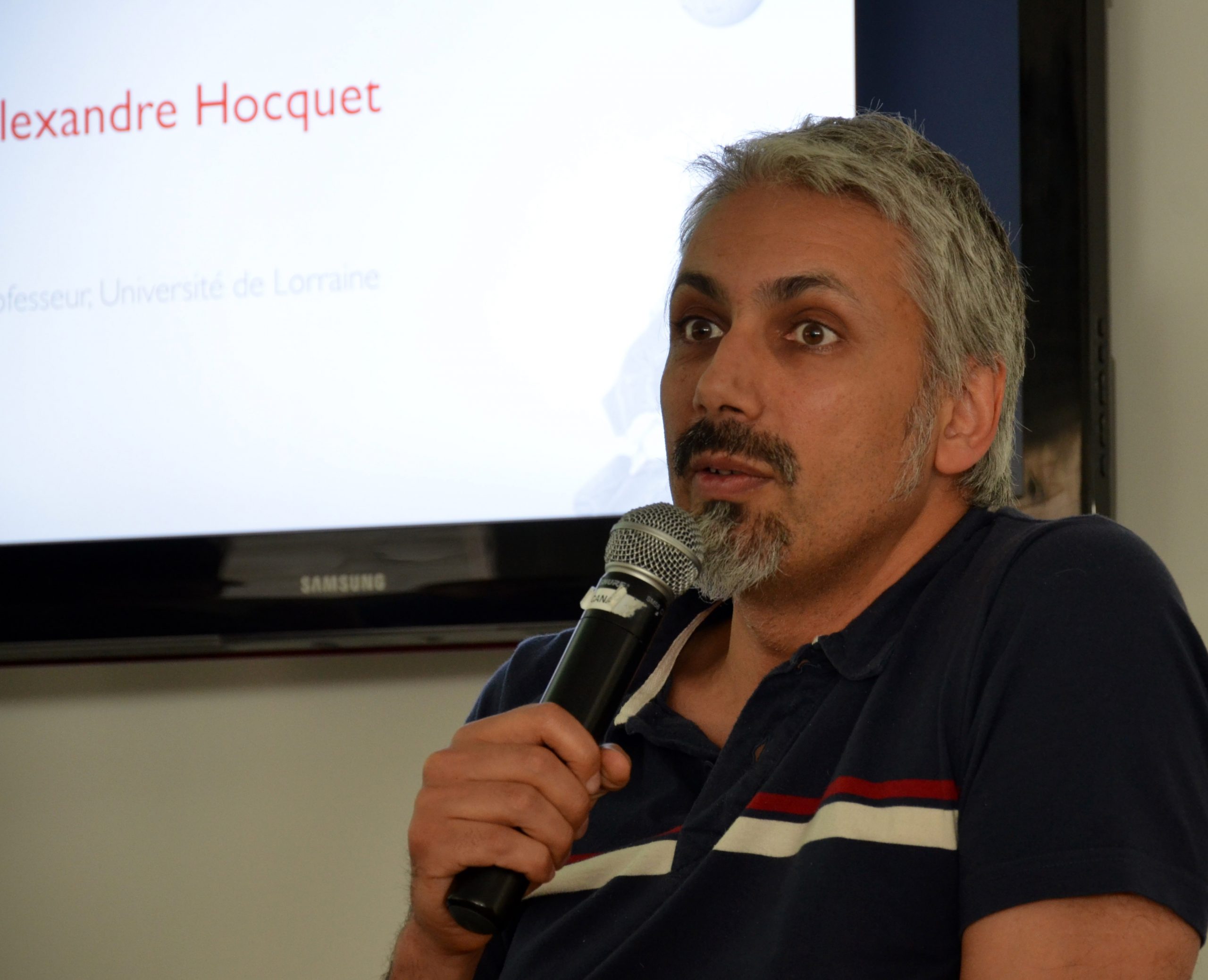
Alexandre Hocquet
Senior Fellow at c:o/re (10/2021-03/2022)
Alexandre is Professor of History of Science at the Université de Lorraine, France, and Member of the Laboratory Archives Henri-Poincaré. He has published extensively on the topic of open science. This blog post is in fact an updated shorter version of a book chapter, and it is at the same time an experiment. So, please go ahead: Steal this post!
One of our research topics is the complexity of what does it mean to be open in science and what does this imply. This complexity includes the constellation of phrasings that are using “open” as a prefix (open knowledge, open science, open acess, open data, open source…). We are particularly interested in scientific software. In this context, the licenses of scientific software have a meaning that is often misunderstood. Beyond software, the creative commons licenses applied to scientific texts within the open access framework involve changes in the notion of plagiarism or auctoriality, notions that are often misunderstood as well.
In science, “Open” is a fuzzy word, a “floating signifier” to borrow from Ernesto Laclau. It contains several visions of the world that can be different or even incompatible. An operational way of removing this ambiguity is to actively learn about and engage with user licenses, an operating mode linked to the world of software.
The concept of Open Science tends to gain momentum, gradually becoming the new reference paradigm for the dissemination of research results. In particular, it was pushed by the European Union as part of the “Horizon 2020” program. In April 2016, a solemn appeal was launched from Amsterdam to encourage member states to initiate actions for Open Science. Considering that it improves the quality, efficiency, and responsiveness of research, the European Commission kept Open Science as a policy priority and, supposedly, a standard method of working in its newer “Horizon Europe” program. If the definition of the Open Science concept is fluctuating and difficult to grasp, it is generally agreed that its potential goes beyond Open Access. Inspired by the same general philosophy, it is applied to other objects than scientific publications. Open science also concerns software used by researchers to conduct their research (open source), as well as the data on which they rely (open data), all of which are often associated with a discourse on reproducibility in science.
Open Access without open licenses is nonsense and a regression in regard to the original spirit that inspired the editors of the Budapest Initiative. Being free to read is only a small part of the possibilities that open licenses entail. The freedom offered by open licenses is only valid, however, if they are actually used. This is what we try to do modestly contribute to by writing this text. Creative commons licenses applied to texts, or data, or even works in general are powerful tools that originate historically in the influence of the free software movement (and its sometimes antagonistic versions, i.e. the open source initiative). This comes down to a certain way of thinking about how to share. The free software movement, imagines “open” as a philosophy that allows individuals to be autonomous and adds an element of proselytism. It is a vision that strives to make the world compatible with its ideal. It corresponds (roughly speaking) to the CC-BY-SA license. Wikipedia is the most well-known project that operates under this licensing policy. For the open source movement, “open” is regarded as a business opportunity based on diffusion and collaboration, and it corresponds to CC-BY. It is agnostic towards further reuse being open or enclosed. The difference between these two visions of the world lies in a “share alike” clause that obliges the one who reuses to do so under the same license. This “free software” version (whose heroic figure is Richard Stallman) of what is open is inspired by a certain idea of the science related to the communalism/communism described by Robert K. Merton,[3]Robert K. Merton. 1973 [1942]. The Normative Structure of Science. In idem (ed.): The Sociology of Science. Theoretical and Empirical Investigations. Chicago: University of Chicago Press, 267–278. and is also a political movement. The “open source” version (championed by Eric Raymond) is about pragmatism and business opportunities.
It is not a coincidence that the licensing of choice for open access publications is CC-BY. It is sometimes advised that open data are also released under a CC-BY or even CC0 licence. The opportunities for reuse are arguably broader in scope. The caveat is in the form of possibilities to eventually enclose what was supposed to be open in the first place. For example, this is what happened to the Android operating system or the Github platform. You can also do the same with this blog post now.

proposed citation: Alexandre Hocquet. 2022. Steal this Blog Post! https://khk.rwth-aachen.de/2022/03/03/2415/2415
References
| ↑1 | We have even let the originally French text run through an open source translation program. |
|---|---|
| ↑2 | The title is a reference to the 1970s counterculture textbook titled “Steal this book”. We are not the first to make use of this pun. See, for example, “Steal this review” by Chris Kelty. |
| ↑3 | Robert K. Merton. 1973 [1942]. The Normative Structure of Science. In idem (ed.): The Sociology of Science. Theoretical and Empirical Investigations. Chicago: University of Chicago Press, 267–278. |
The Long Summer of Anarchy on the Old Mountain
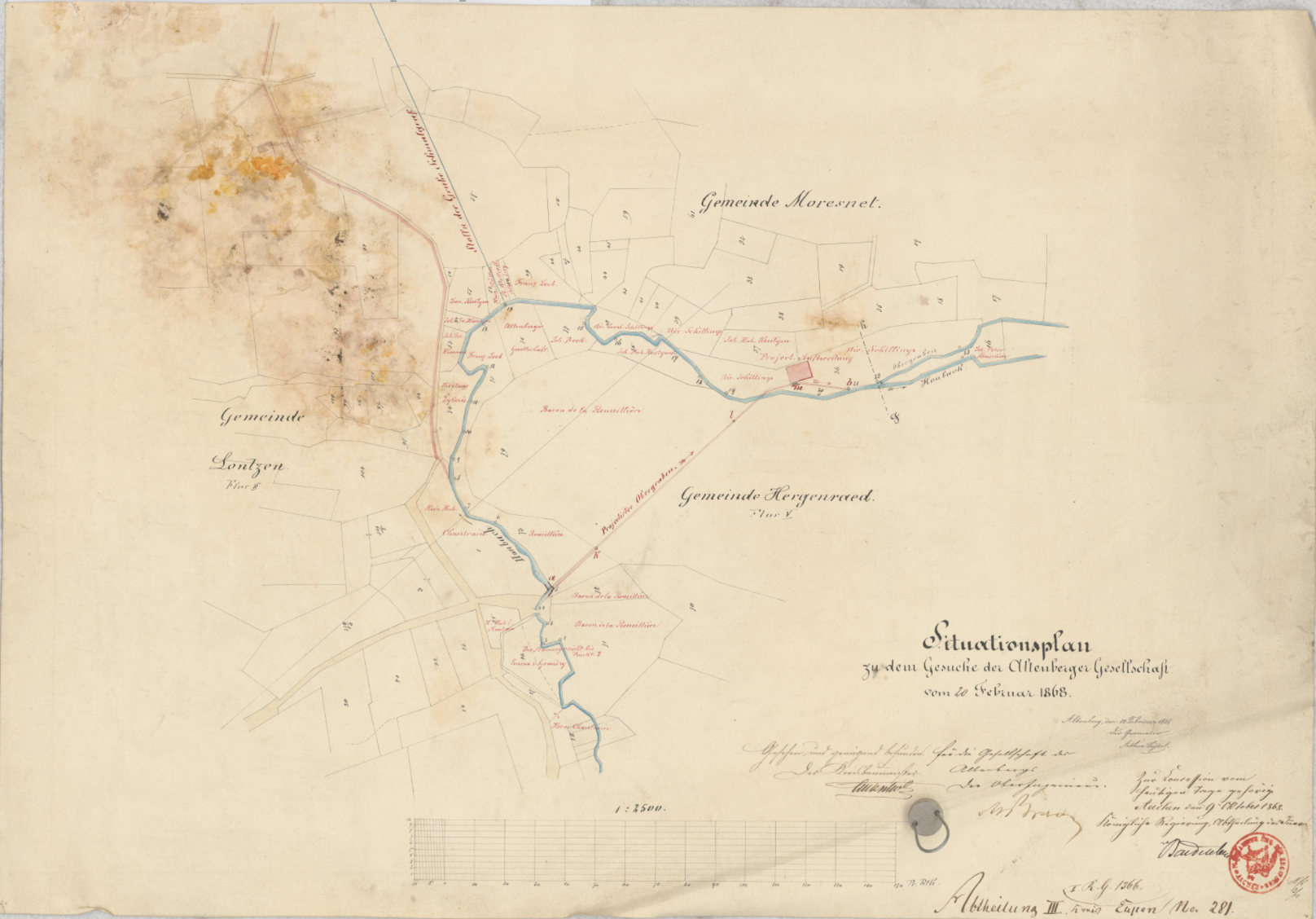
FREDERIK STJERNFELT
The midget state of “The Neutral Moresnet” on the outskirts of Aachen: a historical footnote or a political utopia?
Did you ever hear about “The Neutral Moresnet”? Neither had I, before I recently moved to Aachen close to the German border with Belgium and the Netherlands. But from my position in the North-Western edge of the city, it is less than five kilometers to this strange area. Here was located, for more than a hundred years, a midget state governed by both Germany and the Netherlands – or rather: by neither of the two.
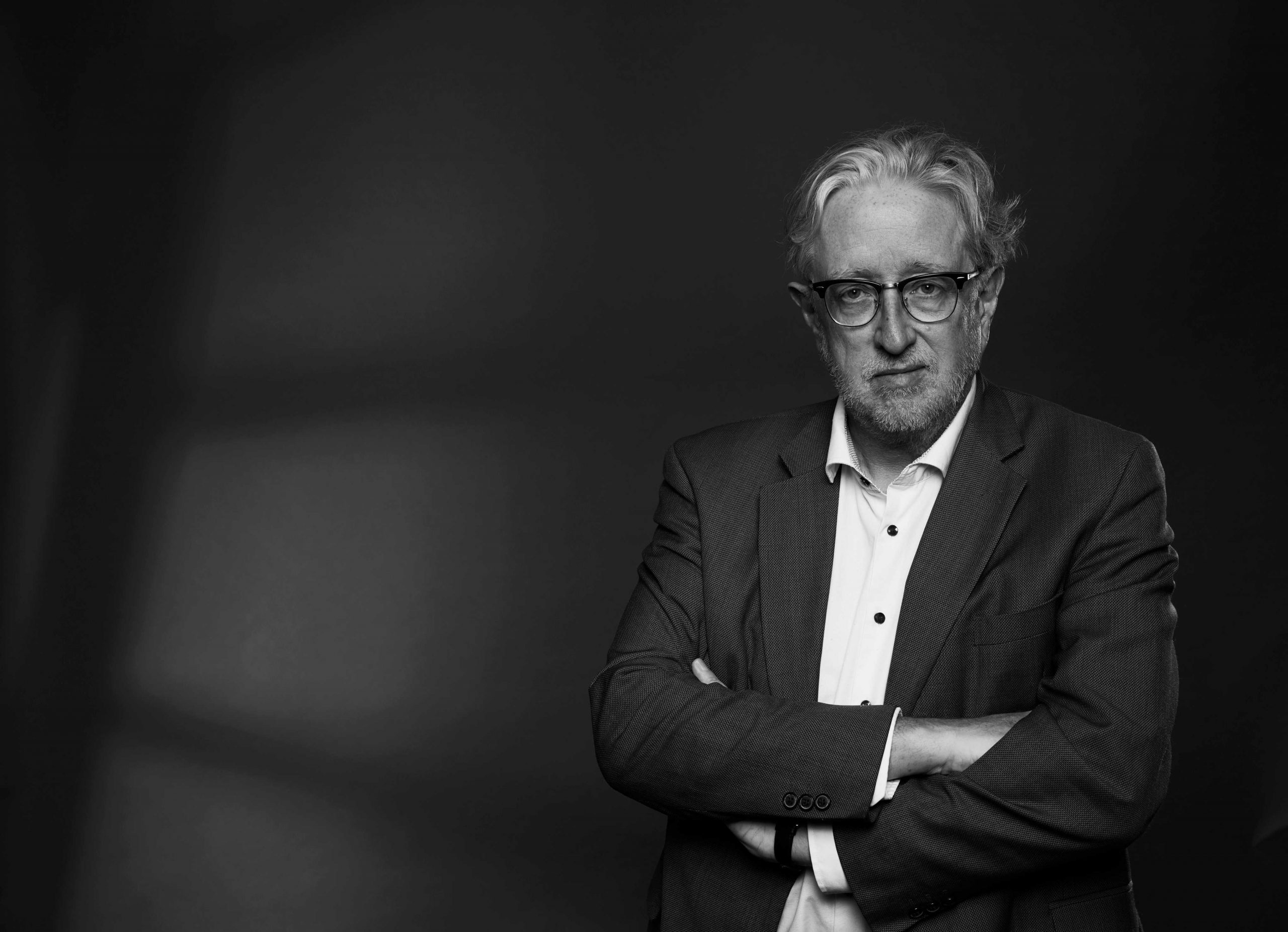
Frederik Stjernfelt
Senior Fellow at c:o/re (10/2021-09/2022)
Frederik Stjernfelt is Professor at the Department of Communication, Aalborg University Copenhagen, Denmark. He is an author for the Danish weekly newspaper Weekendavisen, for which he wrote a longer version of this text.
The prehistory lies with the Vienna Congress after the final defeat of Napoleon in 1814. At that time, the political borders of Europe were to be redrawn in a conservative balance of powers. One of the results was the construction of the United Netherlands as an autonomous kingdom – whose borderline to Prussia now had to be drawn. Here was a problem. In the borderland, in the small village of Kelmis, rested one of the world’s largest deposits of zinc – the village is named after the mineral calamine, zinc oxide. The interest in this metal, well fitted for many purposes such as covering the roofs of modern 19th century Paris, was increasing, and none of the two countries was willing to let the neighbor get away with the riches. The result of the negotiations was a compromise: a structure in international law known as a “condominate” – an area with shared sovereignty. Revenues from mining were shared between the Netherlands and Prussia. The Neutral Moresnet was a tiny zone, an oblong, roughly triangular pie slice; its basis rested on a couple of kilometers of the Aachen-Liège main highway, and a pointed end of 4-5 kilometers up to the the low mountains where Holland, Belgium and Germany now meet. As its legal basis the Code Napoléon applied.
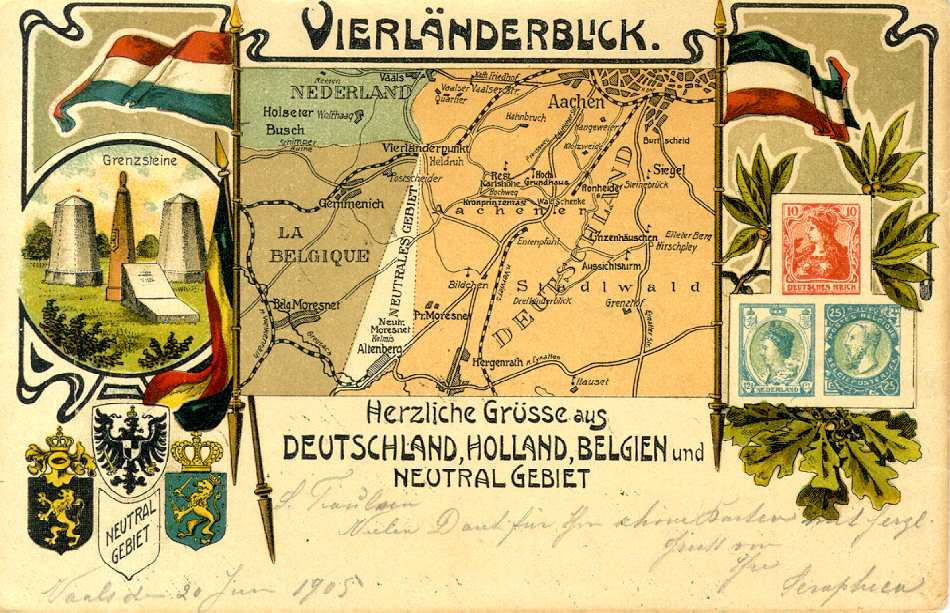
An enclave based on zinc and governed by (almost) none
The administrator of the area became a mayor assigned by the two countries, and security in the small village with 256 inhabitants should be granted by one single gendarme, who, in emergency cases, would have the authority to call upon police forces from the neighboring states. In the area, “platdiets” was spoken, a dialect somewhere between Flemish and Low German. With the independence of Belgium in 1830, the new Belgian state took over responsibilities of the United Netherlands, and in the steadily growing population of the area, you could find both Germans, Belgians, Dutchmen – and “Neutrals” without any citizenship at all.
Zinc was the motor of this strange construction. The colorful entrepreneur François-Dominique Mosselman took over the business of the French engineer Jean-Jacques Dony who had secured himself a concession from Napoleon himself in 1806 to mine zinc in Kelmis . Mosselman founded the company, Vielle Montagne, in German Altenberg – that is, The Old Mountain, and invested in a comprehensive improvement of the efficiency of production. He saw to the construction of a railroad line and began importing zinc ore from all of Europe to his top modern plant in Kelmis. With the economic upswing, the population of the enclave then numbered several thousands. In reality, the “Neutral Moresnet” was a mini-state governed by a joint-stock company.
The Wild West outside of Aachen
But neutrality also gave rise to odd and surprising possibilities. None of the two constitutive countries had the right to levy duties and taxes in the area, and the prices of many goods soon sank considerably under the level of the neighboring countries. This applied to alcohol especially, and soon distilleries began to emerge in Neutral Moresnet. The population largely consisted of mine workers – men, women, and children alike – and after a hard day’s toil they cut loose and caroused in one of the 80 public houses in the minuscule area. As time went by, many of the hosts began to extend business with cabarets, and the population of a few thousand seemed to have had access to a rich cultural life of comedians, singers, dancers. Other, more shady occupations joined them: prostitution, gambling, smuggling. The gendarme, patrolling the area armed with his baton, hardly had much control over what really went on there. The smuggling of alcohol, particularly, became a strong enterprise, and myths circulate about how inhabitants might take their bicycle to work outside of the zone, every day filling up the tubes of the bicycle frame with moonshine which could now be drained and sold at expensive prices in Aachen or Liège. Neutral Moresnet also attracted draft dodgers, and girls with a higher social background who had become pregnant outside of marriage, gradually learned that you could refer to Neutral Moresnet where wet nurses were willing to take over unwanted kids for a suitable payment.
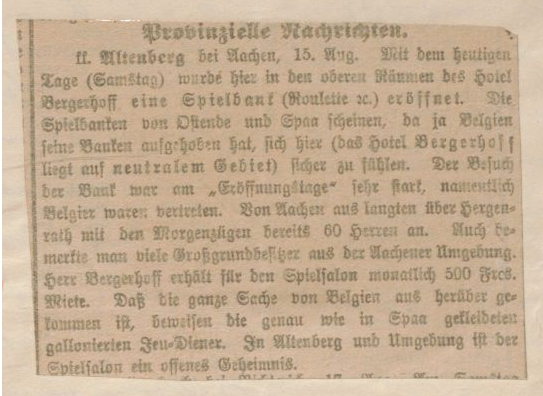
Anarchical conditions, in short, developed. Neutral Moresnet grew to a strange piece of Wild West, a tiny lawless spot outside of political control where very different types of persons might pursue happiness beyond the laws and regulations of the surrounding countries. When the exploding casinos of Europe were gradually prohibited around 1900, statelets like Monaco were quick to grasp the opportunity. This also was the case in Neutral Moresnet, and a casino was established in the hotel in Kelmis. Suddenly, the rare, new, shiny automobiles from Aachen, Liège and Maastricht could be seen flocking there. There was no law against gambling in the Code Napoléon, but in a rare display of unity, German and Belgium intervened to stop it.
Moresnet – the Seat of Friendship
The most touching events of Moresnet, however, are the utopian vistas that began to develop. The first one began as a sort of joke. In 1867 in Bruxelles, Jean-Baptiste Moens, publisher of the journal Le timbre-poste for stamp collectors, got the ingenious idea of catching his business opponent Pierre Mahé red-handed by publishing a piece of fake news in his own journal. What would be more obvious than spreading the news that the ministate of Neutral Moresnet had now begun to publish its own stamps? Mahé fell right into the trap and passed on the false news story in his journal Le timbrophile. But in a strange reversal, the joke became reality.
Already in 1883, Moresnetians began to use a flag – a tricolor with three horizontal strips of black, white, and blue. Why not publish stamps as well? Moresnet’s house doctor Wilhelm Molly founded the company of Verkehrs-Anstalt Moresnet, which published a series of eight stamps referring to Poste intérieure de Neutre Moresnet – the interior mail of the Neutral Moresnet. It might appear strange. No two houses of the area were more than two kilometers apart, and most of the inhabitants would be able to deliver their messages themselves. The stamps had no validity beyond the borders of Moresnet, in the lack of membership of international postal organizations. Was the initiative intended as a sort of political signal? In that case, Molly certainly succeeded. The Moresnet stamps gave rise to immediate anger in Bruxelles and Berlin alike. The idea, however, may also have been a personal investment for Molly. Even if Le timbre-poste scornfully made it clear that the Moresnet publications could in no sense be said to be real stamps, collectors would not be scared, and Molly’s stamps soon became valuable rarities.
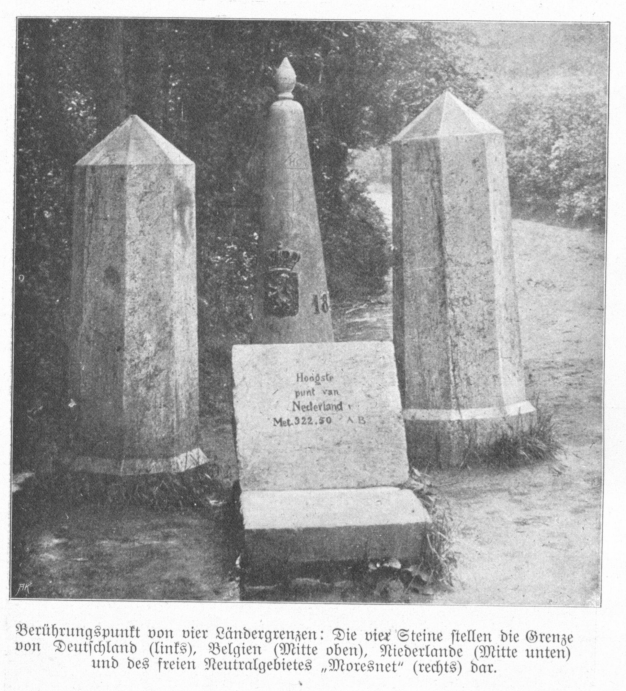
But stamps were also a symptom that the Neutral Moresnet was in the process of developing a sort of political identity, a patriotism which might focus on exactly the anarchic character of the zone. In 1906, Molly met Gustave Roy who was a glowing esperantist. The period around the turn of the century was bubbling with ideas about a simple, artificial language able to transgress linguistic and cultural borders and grant world peace. Among those, Esperanto was clearly the most successful. Why not turn Neutral Moresnet into the world’s first Esperanto-speaking state? This would have made it more difficult for Belgium and Germany to cancel the autonomy of the area, such as circulating rumors were warning. Esperantist feasts, celebrations, and parades were organized, the mining company was involved, shops began to market their goods in Esperanto, even the waiters at the hotel felt obliged to learn a couple of idioms. The Esperantist World Congress in Dresden applauded and even declared that the headquarters of the movement should be transferred from Geneva to Moresnet. The Esparantist song “La Espero” was adopted as a new national anthem of Moresnet, praising internationalism and the beautiful altar of friendship to the tune of “O Tannenbaum”, and the green star of Esperantism was added to the Moresnet tricolor. The name of the new state would be “Amikejo” – The Seat of Friendship – and The Old Mountain itself bore the name of “Kvarstonoj”. Newspapers across the world reported about the project. Moresnet was increasingly referred to as a state in its own right in international media. But Bruxelles was not enthused, Berlin even less. Moresnetians organized delegations to King and Emperor in the two cities in a vain hope to protect their autonomy.
In the end, the Germans turned off the electricity. The new director of the Vieille Montagne, Charles Timmerhans, in 1913 had to go begging at the German government representative in Aachen – residing in Schinkel’s palace on Theaterstrasse 14, now the RWTH’s seat of the Human Technology Center (HumTec). Timmerhans did not succeed, however, to persuade the Germans to turn on the light switch so that zinc production could be resumed. The Germans wanted to cut the area into two, once and for all. But all these negotiations were swiftly overtaken by the outbreak of the First World War in August 1914. As of 1920, the now 5.000 inhabitants of Moresnet became Belgians. The bloody repetition of military events across the area in the Second World War did not change this outcome, even if the post-war period made coffee a new lucrative item for smuggling in Moresnet. One hundred years of anarchy had ended.
Shining example Moresnet?
Is there anything to be learnt from the curious example of Moresnet? The American investor and anarcho-libertarian Peter C. Earle thinks: yes. In his booklet A Century of Anarchy, Earle declares himself a revisionist and presents the argument that the example of Moresnet goes to show that peace and prosperity is possible without force, without state, without government. In the absence of high taxation and export-import control, the enclave of Moresnet became prosperous, and the inhabitants managed to solve disputes in a flexible way with the mayor and gendarme, Earle claims. One would like, however, to have access to a credible criminal statistics of the area. Earle refers to the traditional urge for liberty among mountain people – even if the rugged and mountainous character of the area, truth be told, is rather limited and rather amounts to sweet rolling hills. Not only must it be said that Eales does not testify to any more close knowledge of the history of the enclave – he also overlooks the special boundary conditions of the area. Its prosperity basically had its roots in the presence of a rich zinc vein and related international investments, plus smuggling and other shady businesses – while railroads, electricity, mail, telephone, security were taken care of by the two conflicting protecting powers. The Dutch author Philip Dröge’s small bestseller Moresnet (German: Niemands Land) is a more thorough source of information about the area – from which the present small article has benefited.
If you take a trip to Moresnet today, you must sharpen your gaze to catch a glimpse of the traces of the glorious days of neutrality. There is a fine small museum in the former railway station, but the old industrial architecture is long gone, and the large open mine has been filled up. There are no longer 80 pubs, but there is no lack of serving establishments, and the delicious and hearty Belgian cuisine cannot be denied, e.g. at the Auberge de Moresnet to which I can offer my best recommendations. In 2020, the last “neutral” died, the 105-years old Catharina Meessen. Might Moresnet, in a parallel world, have survived like San Marino, Andorra, Athos, or other strange bunions on the map of Europe? With its 3½ square kilometers, Moresnet boasts almost the double area of Monaco. An economy of philatelists, history buffs, casinos, tourism, alcohol, plus a Michelin restaurant or two, might it have attracted sufficiently many – here, only one hour of driving form Bruxelles or Cologne, ten minutes from Aachen, maybe also attracting speculators and tax fraudsters like the Channel Islands?
This would hardly, however, have realized the more ambitious political visions of the Neutral Moresnet.
References
Peter C. Earle. 2014. A Century of Anarchy: Neutral Moresnet through the Revisionist Lens, Intangible Goods.
https://www.mindat.org/loc-304.html
https://www.trois-frontieres.be/D/moresnet_neutre.php
Philip Dröge. 2017. Niemands Land: Die unglaubliche Geschichte von Moresnet, einem Ort, den es eigentlich gar nicht geben durfte. München: Piper Verlag.
Featured image: Map of the municipality Moresnet, 1868; LAV NRW R, RW-Karten 6317.
proposed citation: Stjernfelt, Frederik. 2022. The Long Summer of Anarchy on the Old Mountain. https://khk.rwth-aachen.de/2022/02/02/2311/2311/
“Only the Initiates Will Have the Secrets Revealed”
Tune in for the next talk in our Lecture Series “Cultures of Research – Digitalization of Research“. On Wednesday, January 26th, Alexandre Hocquet (Fellow c:o/re Aachen, Archives Henri Poincaré) will talk about the Politics and Materialities of Open Science.
The talk focuses on software in science and its diversity of entanglements with openness. Software has been “eating” the world, and science is no exception. From Excel to complex “big” scientific instruments, via Photoshop or molecular modelling software suites, the vast majority of software used in science is not open, and a vast majority has nothing to do with computer science. When software is open, it is very often naively represented as a solution to all issues in science, especially reproducibility. Yet, even open software is full of epistemic issues, from governance to consistency, and the consequences of its influence on the rest of open science are often misunderstood, especially regarding licensing policies.
Who are ‘You’ in the Future of Humanity?

STEVE FULLER
Does being human require a certain kind of embodiment? This may sound like a strange question because we are accustomed to the equation, ‘Human = Homo sapiens’. Thus, the natural way to interpret talk about ‘animal rights’ or ‘machine rights’ these days is in terms of granting ‘rights’ in some sense to beings not embodied as Homo sapiens. But alternatively, we could simply mean extending the status of ‘human’ to animals and machines. The latter interpretation, while counterintuitive at first glance, would be truer to the uneven legal application of ‘human’ in the history of Homo sapiens. After all, we are still struggling to accept all members of Homo sapiens as ‘human’, even though ‘humanity’ has been attributed to animals, machines – and even extraterrestrials – down through the ages.
Now, you might read this last sentence as a moral indictment of Homo sapiens. On the other hand, you might say that it reveals the historical vagueness of ‘human’ as a predicate that remains even after Linnaeus’ mid-eighteenth-century coinage of ‘Homo sapiens’ to name the human animal. Only then did most modern intuitions about ‘humanity’ start to crystallize. But Linnaeus’ seemingly simplifying move has arguably only complicated matters. Consider these two countervailing developments:
(1) ‘Anthropology’ was coined (by Kant) at the end of the eighteenth century to name the science of Homo sapiens, whosespecies uniqueness has been increasingly challenged by Darwinians wanting to absorb humans into the more general study of animals. The fate of the ‘social sciences’ as separate from the natural sciences hangs in the balance.
(2) At the same time, a vast cross-disciplinary search has been launched to find something distinctive about upright apes that might make them ‘human’ – or more to the point, Homo sapiens as already ‘human’. The quarry has often been defined in linguistic or genetic terms – or both! The results have so far been inconclusive, to say the least.
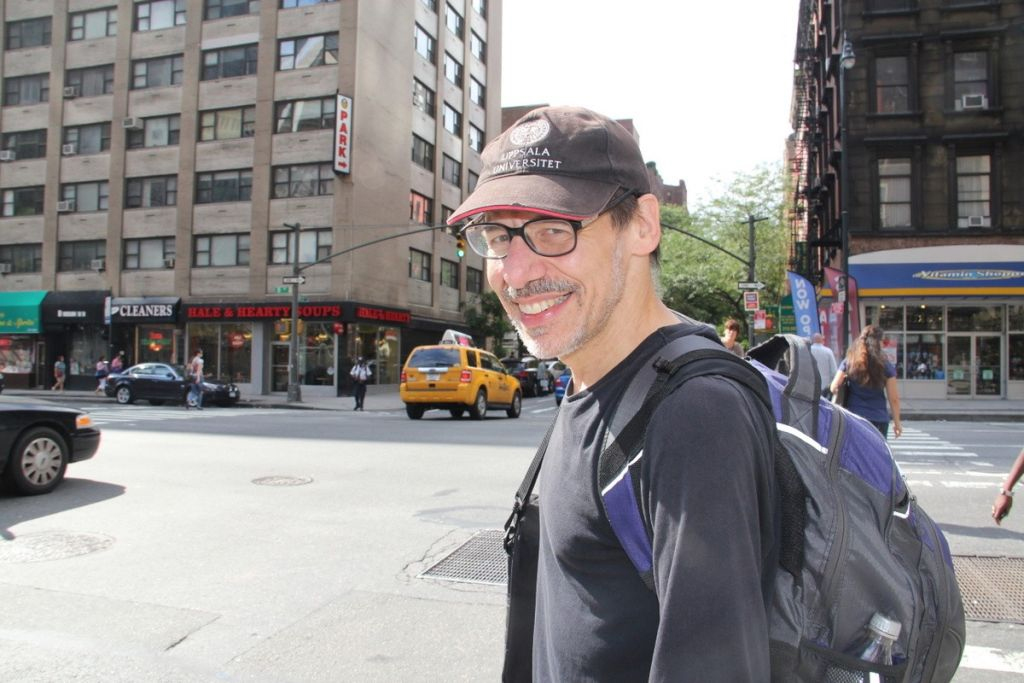
Steve Fuller
Senior Fellow at c:o/re (10/21-09/22)
Steve holds the Auguste Comte Chair in Social Epistemology in the Department of Sociology at the University of Warwick, England, where he founded the research program of social epistemology.
This checkered history in the modern study of the ‘human’ suggests that we might consider the advantages of returning ‘human’ to the status of a vague predicate. From its earliest usage, ‘humanity’ has generally implied educability. It results in what Pierre Bourdieu called habitus, which is in turn ultimately about comportment: how you carry yourself in the world. In very broad terms, the Greeks and Romans focused on self-comportment, whereas the Christians stressed comportment towards others. This helps to explain the survival of ‘dignity’ and ‘recognition’ as normative concepts throughout modern Homo sapiens-centered discussions of humanity. However, the key metaphysical point is that ‘humanity’ is presented as something that one transitions into. It’s not naturally given, but it’s available as an opportunity to seize. This explains the centrality of education in (at least) the Western imagination in both ancient and modern times: It’s the process by which (any)one can become human. It’s also why the ‘humanities’ have been historically central to the university curriculum.
Given the various exclusionary narratives that have evolved around Homo sapiens over the past 250 years, one might conclude that Linnaeus’ coinage has served to restrict – not extend – our understanding of humanity. In this context, the word cishumanity has been coined to characterize what has become our default Linnaean view: that is, to be human is to be born as Homo sapiens. The neologism is modelled on the usage of transgender activists who coined ‘cisgender’ to refer to those who identify gender with the sex of one’s birth – as opposed to the manner of one’s self-presentation. The use of ‘cis-’ in this context has aroused controversy because it draws attention to the privileging of origins – in this case, being born in the ‘right’ animal species – over achievement in the determination of one’s standing in the world. Of course, this is a familiar theme from the long history of human attempts to escape from social discrimination.
But once we take seriously the proposition that humanity is something that one is not born into but rather must achieve, the focus shifts to the criteria of humanity. ‘Criteria’ first became philosophically luminous in the hands of the Stoics, whose worldview was informed by the belief that decisions must be taken against the backdrop of a fundamentally indeterminate world. The ‘only’ question is the basis on which such decisions should be taken; hence the need for ‘criteria’. In terms of modern philosophy, this position captured at once a ‘deontological’ ethics and an ‘antirealist’ epistemology. In other words, you must set the principles of judgement – otherwise there are no principles – and then you abide by whatever follows from that decision. Kant’s greatness came from tackling the question of the ‘you’ in its clearest and most comprehensive form. However, the self-styled ‘cosmopolitanism’ (a Stoic coinage) of his moral and political writings was arguably compromised by his debt to Linnaeus in the Anthropologie.
The ‘you’ in terms of criteria for humanity is the one who decides who else belongs. In this context, I have proposed a ‘Turing Test 2.0’. Whereas the original Turing Test was about selecting out the computer from the human, its upgraded version would select in the computer — or any other being — that passes the criteria, regardless of its material origins. In the spirit of Kant’s categorical imperative, your confidence in the principles that constitute the criteria would be sufficient to judge on behalf of the entire set of beings with which you identify. (Of course, then you would be willing to live with the consequences of your judgements). Such a ‘Turing Test 2.0’ would certify a sense of ‘ontological citizenship’ that binds both the judging and judged entity in a common humanity. The resulting world is one where The League of Humanity liberates the robots in R.U.R. and all the replicants pass the Voight-Kampff test in Blade Runner.
References
Fuller, S. (2014). ‘What scientific idea is ready for retirement?: Human = Homo sapiens’. Edge.org
Fuller, S. (2019). ‘The metaphysical standing of the human: A future for the history of the human sciences’. History of the Human Sciences 32: 23-40. The metaphysical standing of the human: A future for the history of the human sciences – Steve Fuller, 2019 (sagepub.com)
Hernandez-Orallo, J. (2017). The Measure of All Minds: Evaluating Natural and Artificial Intelligences. Cambridge UK: Cambridge University Press.
Featured image: carbon fibers, photo: Mario Irrmischer
proposed citation: Fuller, Steve. 2022. Who are ‘You‘ in the Future of Humanity? https://khk.rwth-aachen.de/2022/01/17/2086/2086/
New Year – New Fellows
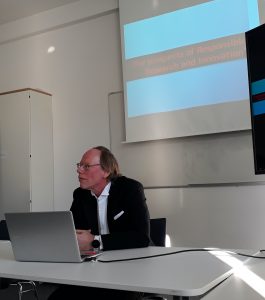
This week, we welcomed René von Schomberg and Catharina Landström at RWTH Aachen university. Like Andoni Ibarra, who arrived at c:o/re in December, René von Schomberg is working on responsible innovation in research with a focus on the value of ‘openness’.René von Schomberg is a Guest Professor at the Technical University of Darmstadt, Germany, and counselor to the European Commission. In a hybrid lunch talk, he gave us a glimpse into his research program for the coming months.

STS scholar Catharina Landström, Associate Professor with a focus on environmental studies at Chalmers University of Technology in Gothenburg, Sweden, is also touching on the subject of open science. After years of intensive field work with a focus on water systems challenges, she is happy to delve into critical text analysis for the coming six month. She will explore how experts argue in writing and how they convey to environmental decision makers the validity, relevance and reliability of knowledge in the face of computer simulation modelling.
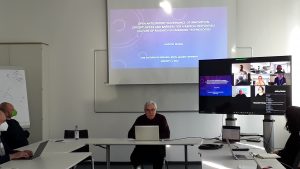
This introduction of the new projects refreshed the academic debate among fellows, as new overlaps unfurled. Upcoming events are meant to further explore these junctions.
First Fellows arrived in Aachen
We are excited to host our first c:o/re fellows in Aachen. They form a international group of distinguished researchers, representing a wide variety of scholarly approaches to the study of science, technology and society. Based at our research center for one year, they are enriching the diverse academic environment of RWTH Aachen University, each developing their own project, about which you can read briefly below.
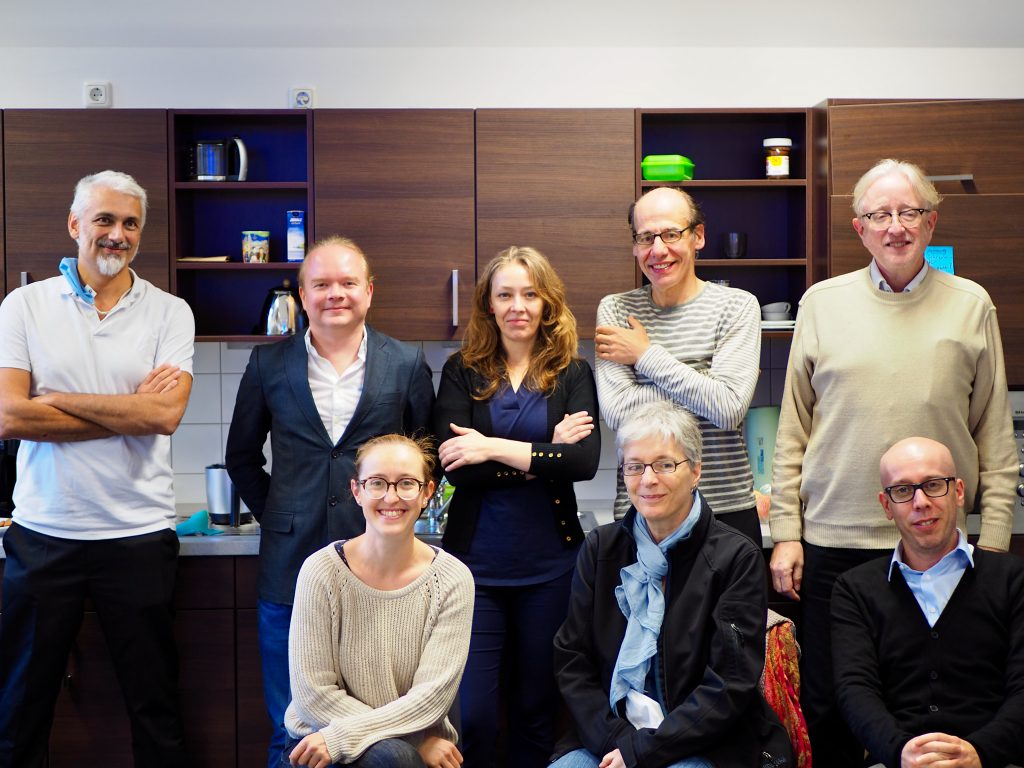
Ana Bazzan is a Professor of Computer Science at Universidade Federal do Rio Grande do Sul, Porto Alegre, Brazil. Her research focuses on multiagent systems, in particular on agent-based modeling and simulation, and multiagent learning for the transportation domain. In her research project, she combines techniques from network theory with agent-based modelling and simulation to investigate complex human behavior in past and present societies.
The relation between humans and so-called intelligent systems, and the social changes associated to the design of such systems – be they ontological, interactional or societal – lies at the heart of Joffrey Becker’s research project. He is a Social Anthropologist and Research Associate at the Laboratoire d’Anthropologie Sociale at the Collège de France, Paris.
Amanda Boetzkes, Professor of Contemporary Art History and Theory at the University of Guelph, Canada, focuses on a different relation: that of humans and environment. During her stay in Aachen, she is working on her project that considers contemporary art’s mediation of climate change and its production of ecological perception in the case of the Greenland Ice Sheet area and its inhabitants.
The “Homo Futura: its History and Philosophy” is one of two book projects that Steve Fuller is working on during his stay in Aachen. The Professor of the Auguste Comte Chair in Social Epistemology at the University of Warwick, England, will be exploring the philosophical and historical background of two very different approaches to grasp humanity’s collective self-understanding: transhumanism and posthumanism.
Alexandre Hocquet is a Professor in the History of Science at the Université de Lorraine, France. His research focuses on the impact that software has on the production of knowledge in computational chemistry. How does software – not only its code, but its design, its usage and licensing among other aspects – transform research? This project adresses “software as the elephant in the room”.
Erica Onnis, Philosopher from the University of Turin, Italy, devotes her work to the understanding and clarification of the concept of emergence. By suggesting a revision of the theory of causation and clarifying the scope of notion of qualitative novelty she is going to develop a taxonomy of emergent phenomena in complex biological systems.
Markus Pantsar is a Senior Researcher in Theoretical Philosophy at the University of Helsinki, Finland. His research revolves around philosophy of mathematics and connected areas, such as AI, logic and complexity. The aim of his project is to contribute to the feasibility of building AI agents with human like-intelligence by taking a computational and cognitive approach.
Frederik Stjernfelt is Professor of Semiotics, History of Ideas and Theory of Science at Aalborg University, Denmark. As the title suggests, his research spans over a broad area of the humanities and social sciences, from meaning and cognition to philosophy of science and free speech. Among other achievements, he is a leading scholar on Charles S. Peirce. His project consists in develpoing a perspectivist philosophical anthropology, as required in the context of humans’ extension onto digital and other technological media.
Fellows Welcome Event

We are holding a Welcoming Event for the Fellows of our Center on Nov. 10th, 2021 at Super C. Vice-Rector for Research and Structure, Prof. Dr. Ing. Matthias Wessling, and Dean of the Faculty of Arts and Humanities, Prof. Dr. Christine Roll, will give a welcome address.
